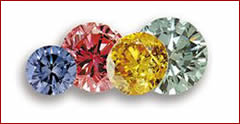|
||||
Hair to Diamonds
Tennessee Williams wrote, ”Man,
when he burns, leaves only a handful of ashes. No woman can hold him the wind
must blow him away.”
Not anymore. The ashes
of the departed can now be converted into an actual diamond. The word
diamond comes from the ancient Greek αδάμας – adámas
meaning unbreakable.
Most natural diamonds are formed at high
temperature and pressure at depths of about 200 miles underground and the
process can take up to 3.3 billion years. The raw material is
Carbon-containing minerals. But diamonds can also be created in a special
laboratory. This involves a high-pressure process
using very high-temperature which simulates the conditions in which diamonds
are naturally formed.
There are a few companies in
the world offering this service but the best known in this part of the world is
Phoenix Memorial Diamonds. All they need is the ashes, hair or nails of the
deceased (they can also make diamonds from the ashes of your deceased pet.)
I asked Managing
Director Mike Kelly for a bit of information on their product,
“Phoenix Memorial Diamonds are genuine diamonds. They
are not synthetic or cheap imitation but real diamonds only created in a
laboratory. They possess the exact same characteristics of mined diamonds, they
are cut and polished in exactly the same way as natural diamonds have been for
centuries. . . They have all the attributes of natural rare (fancy) diamonds
ripped from huge mines - same fire, same hardness but without the social
stigma, the blood sweat and tears of hard labour or the environmental issues
having a massive impact on the earth.”
What colours can they make?
“We only grow NATURAL coloured diamonds. We do not 'irradiate' to change the
colour. The usual and natural outcome when using human or animal carbon is a
canary yellow diamond. It is also possible to make diamonds in NATURAL shades
of blue [and by extra processing - pink, red and green]. We stick to two –
Canary yellow and a Free-Range Blue. Mined diamonds in these colours are called
'fancies' and can costs many thousands of pounds per carat – sometimes more
than the white/clear diamonds we are all familiar with. The yellow and blue hue
does not stop the fire and the scintillation of light sparkling through.”
Being a man of enquiring mind I did, of course, ask Mr Kelly, “How do you do
it?” only to be told,
“Our process
is a trade secret, backed by years of expertise using very special scientific
processes, but put simply - we emulate nature – by using fantastic heat,
massive pressures, over a period of time. Instead of millions of years it can
be achieved in a few months. We then cut and polish the created raw diamond
just like mined ones have been for hundreds of years. The human body is
basically carbon (and water and other minerals). The lab' take the carbon,
purify it and use it in the HHHP high-pressure process but instead of Millions of years the
process can be completed in about 3 months.”

|
Why make diamonds only from the remains of the dead? Rod Stewart once famously
said, “There is no point in getting married; just find a woman you don’t
like and give her a house.” What put that into my head? Well . . . since
Phoenix Diamonds can also make diamonds from hair why not take the hair of a
woman that you don’t like and have it made into a diamond for a woman that you
do . . .?
Mr Kelly and his team of experts don’t make diamonds only from the
remains of the dead. Francis L. Cornford said that nothing should ever be done
for the first time. Phoenix Memorial Diamonds certainly didn’t take his advice;
the company has several “firsts” under its belt.
They made
the first diamonds from umbilical cords, dead bees (“that died from natural
causes but from the deaths of 2500
honey bees they will live-on, because from their bodies we extracted
their unique carbon, compressed it at 10,000 tons/sq.ins. and heated it to
1300c for some time, to produce a raw diamond which we cut and polished with 58
facets in a brilliant cut.”
) And . . .wait for it; Glasgow artist - Teresa Margolles -
asked if it was possible to make a Blue diamond from the detritus of the
'London Riots' (using carbon extracted from various bits of wood, sweepings and
other debris) The result? Mike Kelly tells me, “After extensive processing,
we are proud to show the actual diamond featured in the exhibition.”
Mr.
Kelly also told me about another “first” Promessa Diamonds but being a
low-tech animal I wasn’t able to grasp the finer points of the process. But you
dear digitally-included reader will find all the info on their website; www.phoenix-diamonds.com
Phoenix
Memorial Diamonds, Hulley Road, Macclesfield, SK102LP, UK.






No comments:
Post a Comment